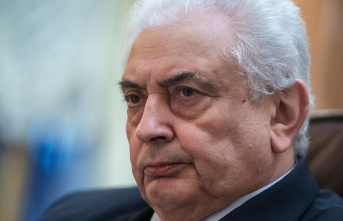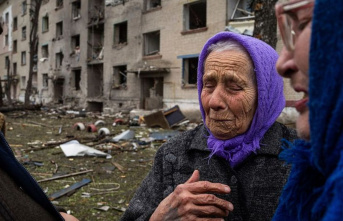Bachmut seems to have fallen, after a long, tough struggle the Wagner mercenaries apparently succeeded in throwing the last Ukrainian defenders out of the city. Yevgeny Prigozhin, head of the Wagner troupe, announced this on Saturday - Russian media picked up the news immediately. However, the Ukrainian leadership disputes Moscow's military success. President Volodymyr Zelenskyj, who had initially fueled speculation about the conquest of the city with misleading statements, on Sunday rejected the complete capture of Bakhmut by Russian troops.
The assessment of the battle is largely determined by the viewer's point of view. From the Ukrainian point of view, the heroism of the defenders, the long duration of the defensive struggle and the horrendous Russian losses are cited. Garnished with remarks about how unimportant the city was and - if you were completely convinced - that the retreat was only a tactical maneuver, since the city, now occupied by Russians, would soon be surrounded by flank attacks. The Russians are trapped.
The Russians, on the other hand, will emphasize that they took the city and were ultimately victorious. They, too, will take credit for Ukraine's heavy casualties. And gleefully gossip about old reports that their fighters are stupid zombies or untrained criminals who have only been burned with shovels.
How does it really look now? Bakhmut as a city has no strategic importance. Now it is a field of rubble where nothing works anymore, and even before the fighting, Bakhmut was only the 80th largest city in Ukraine and did not house any important industries. But Bachmut was built into a fortress and that is where the meaning of the city lies: "Fort Bachmut". The city was fortified for years. It offered excellent basic conditions for defense because of its location and size. The city is surrounded by rivers and canals. And stands out sharply from the surroundings, so it doesn't meander in a sea of buildings. With its skyscrapers, it dominates the area. Their small size made it possible to defend them efficiently.
That fortress has now fallen. With this, the Russians did not achieve a breakthrough. Bakhmut lay as a breakwater in front of the last line of defense in the Donbass. This continues to protect the country up to the Dnieper. It is not at all foreseeable that the Russians will be able to attack or even capture the cities of this chain. But they are threatened since their breakwater fell.
In general, the defender has an advantage in city battles. In pure doctrine, the attacker needs far more soldiers to achieve success. On the other hand, the victory is mostly on the side of the attacker. The Germans were not defeated in Stalingrad in the urban area. The Soviets broke through the German lines far outside the city on the steppes and encircled them in the city. Ukrainian armed forces are better able to adapt to rapidly changing situations. Their strength is mobile combat. In Bakhmut - as before in the Donbass - the Russians managed to involve Kiev in largely static combat, where the Ukrainian armed forces could not exploit this advantage. The Russians explicitly call their procedure the "meat grinder". The advances in the field mean little, it is only important to wear down the enemy's troops.
In the ten months of raging battle, the Russians did not succeed in encircling the Ukrainians as they did in Mariupol. The Ukrainian routes to the city were threatened at times. But at least smaller roads and dirt roads always remained open. And despite the Russians' proximity, the firepower of their artillery and the use of drones, they have not been able to completely paralyze traffic. The paths are lined with burned wrecks, but given the length of the fighting, the casualties don't seem particularly high.
In this way, the Ukrainians were able to bring out supplies and fresh soldiers to the city and its wounded until the very end. The last retreat from the city was also orderly. The Russians will not have hundreds or even thousands of prisoners, and the last rear guard was not shot down in the fields before Bakhmut.
But Kyiv did not succeed in many things either. Despite the use of Himars and reports of burning Russian depots, the Russians did not suffer from a lack of supplies. And if they do, then because of animosity between the Wagner group and the professional military. In the final stage of the battle, the areas of the "Citadel" remaining under Ukrainian control were continuously and massively shelled. Entire streets went up in flames. There was no sign of a lack of ammunition. There is also another factor. Despite Western air defense assistance, Putin's air force is playing a role again. The Russians -- like other countries -- have developed a kit that turns the existing "dumb" bombs into precise glide bombs. They are dropped by a jet just outside of the range of Ukrainian air defenses and then sail to their destination (Putin's air force is back - so deadly are the new improvised glide bombs). So warheads of 500 kilograms and more can be used. This weapon completely changed urban combat in Bakhmut. Soviet-era skyscrapers or bunkers can only be destroyed slowly and with great difficulty by artillery. A bomb hit, on the other hand, cuts such a high-rise building into pieces. It is to be feared that the Russians will develop glider kits for even heavier bombs in the future (Will Putin use the father of all bombs?) The great losses of the Wagner mercenaries were extensively reported in the West. That will be true in the case of the poorly trained criminals. But in the final phase of the battle for Bakhmut, the mercenary troop showed itself to be not drained and exhausted. She acted more decisively and stronger than ever. One shouldn't have too high hopes that there will be nothing left of the group.
The capture of Bakhmut was slow, the Ukrainians put up a stubborn, retreating resistance. Less attention is paid to the fact that the Russians were apparently able to adapt better to the conditions than the Ukrainians. Their efforts became more effective over time, the pace of their advance quickened, the defenders' resistance did not weaken to the last, but they found it harder to repel the attacks. They were also expelled within a few days from the last zone of the "citadel" held by Kiev.
Why is that? The Russians are now better able to coordinate even complex operations. Coordinate the attacks of their stormtroopers with drones, glide bombs and artillery. Like the Ukrainians before them, they are able to deploy their troops according to the quality of their training. Then they realized that heavy vehicles are easy targets in urban combat and firepower must come from artillery, mortars and rocket launchers. Bakhmut was a battle of infantry groups.
And here, too, the Russians have had a learning curve. At the beginning of the war, a video emerged of a whole group of Russian soldiers being trapped in an elevator because the janitor stopped it. Nothing like this will happen again. The Wagner mercenaries learned their lesson in house warfare.
What follows from the capture of Bakhmut? First of all nothing, it is rather unlikely that the Russians will start further major conquests from this area. They have gathered foot soldiers in the city. Armored troops would have to be used in open terrain, if that would be possible at all.
It is unclear whether Kiev will continue to try to break through the Russian positions on the flanks of the city. The prospect of encompassing, or at least threatening, the city is appealing. Both the northern and southern flanks are defended on the Russian side by troops inferior to Ukrainian forces.
But Kiev's troops have been stuck for 14 days. They continued to make gains ahead of the Russian line, failing to break through. The Russians had had enough time to adjust and bring in more troops to reinforce the line of defense and also to seal off a possible breakthrough.
Even British intelligence, always very optimistic about Kiev's prospects, confirms the Russian reinforcements.
The elapsed time reduces the probability of a Ukrainian success. Not only were the Wagner mercenaries released, but also the massive firepower of the Russian artillery in the Bakhmut area. With the same force with which the Russians have shelled the last Ukrainian positions in the city over the past few days, they can now work on the Ukrainian assault troops, who have to hold out in improvised positions in open country.
Both sides will claim a victory. The crucial question is the losses. As long as you can't really quantify them, any assessment of the battle remains speculative or at least preliminary. It should be borne in mind that in the war of the "meat grinder" Russia can take more casualties than Ukraine. Moscow would have to lose disproportionately more soldiers than Kiev to lose according to this logic.
Kiev will rightly claim to have kept the Russians here for a very long time. You can call that a victory, but it's still a success in a rearguard action. The value lies in having prevented something even worse, such as a breakthrough, elsewhere. And so the time for the preparation of the counter-offensive was bought. It is not a victory that opens up new operational opportunities for Kiev - on the contrary.
Russia will celebrate the victory over the rubble - also because of the symbolic meaning of the place and give it the Soviet name Artemovsk again. In the context of the Donbass mysticism from the Stalin era, this is a significant PR success. It was a tedious, costly advance, and this battle will certainly not go down in history as "glamorous". It remains threatening that the best forces in the Ukraine were ultimately unable to stop the Wagner troupe, that the mercenaries have learned a lot and have recently performed far more strongly than at the beginning. This conquest does not open up any greater opportunities for the Kremlin, and Bachmut is not the stepping stone for a large-scale operation in the summer.











